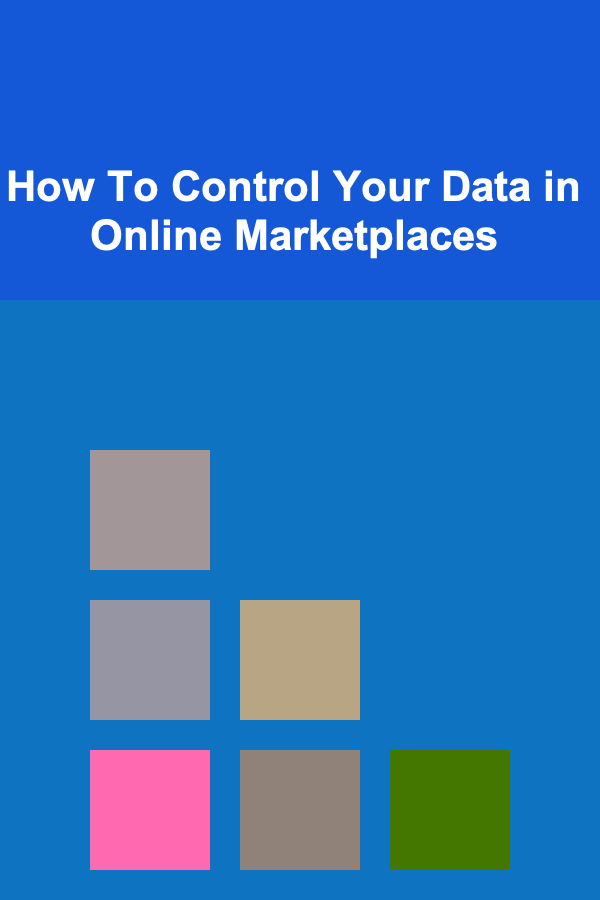
How To Control Your Data in Online Marketplaces
ebook include PDF & Audio bundle (Micro Guide)
$12.99$5.99
Limited Time Offer! Order within the next:

In today's digital world, online marketplaces have become an integral part of our daily lives. From shopping on e-commerce platforms like Amazon, eBay, and Alibaba to buying and selling products in niche marketplaces, these platforms offer unparalleled convenience, choice, and accessibility. However, with this ease of use comes the challenge of managing our data---data that is often used for advertising, product recommendations, and more. The control of personal data has become one of the most pressing concerns of the modern digital age, and online marketplaces are at the forefront of this issue.
In this article, we will explore the importance of data control in online marketplaces, the risks associated with personal data misuse, and the strategies consumers and businesses can adopt to regain control over their data. We will discuss concepts like privacy, data security, data ownership, and the various tools and best practices available to protect and manage personal information.
The Digital Economy and the Role of Online Marketplaces
Online marketplaces have revolutionized the way we buy and sell goods. These platforms act as intermediaries between buyers and sellers, offering a wide range of products and services, often from third-party vendors. The marketplaces themselves have access to vast amounts of data, including purchase history, browsing habits, and even demographic information. As a result, these platforms have an incentive to collect as much data as possible to personalize user experiences, target advertisements, and improve service offerings.
The digital economy thrives on data, and online marketplaces are at the core of this ecosystem. According to Statista, the global e-commerce market size is expected to reach $6.4 trillion by 2024. This growth reflects an increased reliance on online platforms for buying and selling products, and, inevitably, the collection and use of consumer data.
However, while the benefits of online shopping are undeniable, the way personal data is handled remains a controversial issue. Users often unknowingly give up control of their data when they engage with these platforms, leading to concerns about privacy violations, data breaches, and the misuse of personal information.
The Data You Share in Online Marketplaces
When you use an online marketplace, the data you share is typically divided into two categories:
1. Personal Information
This includes your name, address, email, phone number, payment details, and other personal identifiers. It is often required to create an account and complete a purchase on the platform.
2. Behavioral Data
This data includes your browsing history, purchase history, search queries, and interactions with ads. Marketplaces track your actions in order to improve the shopping experience, offer personalized product recommendations, and display relevant advertisements.
Both of these types of data are valuable to online marketplaces, which often use them for various purposes:
- Advertising: Platforms use your data to show you targeted ads based on your interests and behavior.
- Product Recommendations: By analyzing your past purchases and browsing history, marketplaces can suggest products that they believe you'll be interested in.
- Market Research: Data is often aggregated and sold to businesses for market research purposes, allowing them to analyze trends and customer preferences.
- Improving User Experience: Marketplaces may use your data to improve the platform's functionality, speed, and product selection.
However, the extensive collection and analysis of data can raise serious concerns about user privacy and the misuse of personal information. This is where controlling your data becomes vital.
The Risks of Not Controlling Your Data
While sharing personal data on online marketplaces may seem harmless, there are several risks associated with not controlling your data:
1. Privacy Violations
One of the primary risks of data collection is privacy infringement. When you use online marketplaces, your data can be accessed by various third parties, including advertisers, data brokers, and even malicious actors. Without proper control, this data can be sold, shared, or even leaked, leading to privacy breaches.
2. Data Breaches
Online marketplaces store vast amounts of sensitive customer data, and these platforms are prime targets for hackers. A breach of this data can expose personal details, including payment information, addresses, and purchase history, putting consumers at risk of identity theft and fraud.
3. Excessive Data Collection
Many online marketplaces collect data beyond what is necessary to complete a transaction. This can include your browsing behavior, location, and even the devices you use to access the platform. Excessive data collection raises ethical concerns and can make users feel uncomfortable or coerced into sharing personal information.
4. Manipulation and Exploitation
Targeted advertising based on personal data can lead to manipulation. For example, online marketplaces may use algorithms to nudge you into making purchases you may not otherwise have considered. This form of exploitation is often subtle but can lead to overspending, poor decision-making, or addiction to online shopping.
5. Unwanted Tracking and Profiling
Marketplaces can create detailed profiles of users based on their behavior. This profiling can be used to target you with personalized offers or advertisements, and, in some cases, may even influence the types of products and services you are exposed to. This form of tracking can feel invasive and manipulative.
How to Control Your Data in Online Marketplaces
While it may seem like online marketplaces hold all the power when it comes to data collection, there are several strategies consumers can use to regain control over their personal data. Below, we discuss some of the key steps you can take.
1. Review Privacy Policies and Terms of Service
Before signing up for an online marketplace or making a purchase, take the time to review the privacy policies and terms of service. While these documents can be lengthy and difficult to understand, they provide important information about how your data will be collected, used, and shared. Look for the following:
- Data collection practices: What data does the platform collect, and how is it used?
- Data sharing: Does the platform share your data with third parties? If so, which third parties?
- Opt-out options: Can you opt-out of data collection or targeted advertising?
- Data retention: How long does the platform retain your data, and can you request it to be deleted?
Understanding these aspects allows you to make informed decisions about using the platform and can help you take the necessary steps to protect your privacy.
2. Limit the Amount of Data You Share
Whenever possible, limit the amount of personal information you share on online marketplaces. For example, only provide the necessary details to complete a purchase. If the platform asks for additional information (such as a phone number or date of birth), consider whether it's essential for the transaction.
Additionally, consider using temporary or disposable email addresses and phone numbers when signing up for accounts or making purchases to minimize the amount of personal data associated with your profile.
3. Use Privacy Tools and Extensions
Several privacy tools and browser extensions can help you maintain control over your data. These tools block trackers, limit data collection, and protect your privacy online. Some of the most popular privacy tools include:
- Privacy-focused search engines: Using search engines like DuckDuckGo or StartPage prevents search queries from being tracked.
- Ad-blockers: Extensions like uBlock Origin or Adblock Plus block intrusive ads and trackers.
- VPNs: Virtual private networks (VPNs) hide your IP address and encrypt your internet connection, making it harder for online marketplaces to track your activity.
- Cookie managers: These tools let you control which cookies you accept on websites, limiting data collection for targeted advertising.
4. Exercise Your Rights under Data Protection Laws
Many countries have enacted data protection laws to safeguard consumer privacy. For example, the European Union's General Data Protection Regulation (GDPR) gives individuals the right to access, correct, and delete their personal data. Similarly, the California Consumer Privacy Act (CCPA) provides California residents with similar rights.
If you are concerned about how your data is being used by an online marketplace, you can exercise your rights by requesting access to your data, asking for it to be deleted, or opting out of data-sharing practices. Familiarize yourself with the data protection laws that apply in your country or region to understand your rights and how to exercise them.
5. Opt-Out of Targeted Advertising
Most online marketplaces offer options to opt-out of personalized ads. This is a powerful way to regain control over the types of advertisements you see. Typically, this can be done by:
- Adjusting ad preferences: Many platforms allow you to modify your ad preferences in your account settings, limiting the types of ads you see.
- Using ad-blocking software: As mentioned earlier, ad-blockers can prevent ads from loading, which also prevents tracking scripts from collecting your data.
- Opting out of third-party tracking: Websites like the Digital Advertising Alliance (DAA) and Network Advertising Initiative (NAI) allow you to opt out of data collection by participating advertisers.
6. Use Payment Methods That Protect Your Privacy
When making purchases, consider using payment methods that offer an additional layer of privacy. Options like virtual credit cards, cryptocurrencies (such as Bitcoin), or privacy-focused payment platforms like PayPal can help minimize the amount of personal information you share during transactions.
Additionally, some payment services provide features that allow you to limit the information shared with merchants, making it harder for marketplaces to track your spending habits.
7. Review Your Account Regularly
Even after taking precautions, it's important to regularly review your accounts on online marketplaces. Look for any suspicious activity, outdated personal information, or preferences that need to be adjusted. If you no longer use an account, consider deleting it to reduce the amount of personal data the platform retains.
Conclusion
As online marketplaces continue to grow in importance and reach, the question of how to control our data becomes increasingly urgent. While these platforms offer a wealth of benefits, they also come with risks---especially when it comes to privacy and data security. By understanding how your data is used, taking proactive steps to protect your information, and exercising your rights, you can regain control over your personal data and use online marketplaces more safely and responsibly.
In the end, data control is about making informed decisions, being mindful of what you share, and taking the necessary steps to protect your privacy. With the right tools and strategies, you can continue to enjoy the convenience of online shopping while maintaining control over your data.

How to Create a Checklist for Evaluating Company Culture During an Interview: An Actionable Guide
Read More
How to Sell Collectible Coins on eBay: An Actionable Guide
Read More
How to Strengthen Your Front Door to Prevent Forced Entry
Read More
How to Use Investment Clubs to Enhance Your Knowledge
Read More
How to Optimize Content for SEO Ranking
Read More
How to Tackle KenKen Puzzles with a To-Do List Framework
Read MoreOther Products

How to Create a Checklist for Evaluating Company Culture During an Interview: An Actionable Guide
Read More
How to Sell Collectible Coins on eBay: An Actionable Guide
Read More
How to Strengthen Your Front Door to Prevent Forced Entry
Read More
How to Use Investment Clubs to Enhance Your Knowledge
Read More
How to Optimize Content for SEO Ranking
Read More